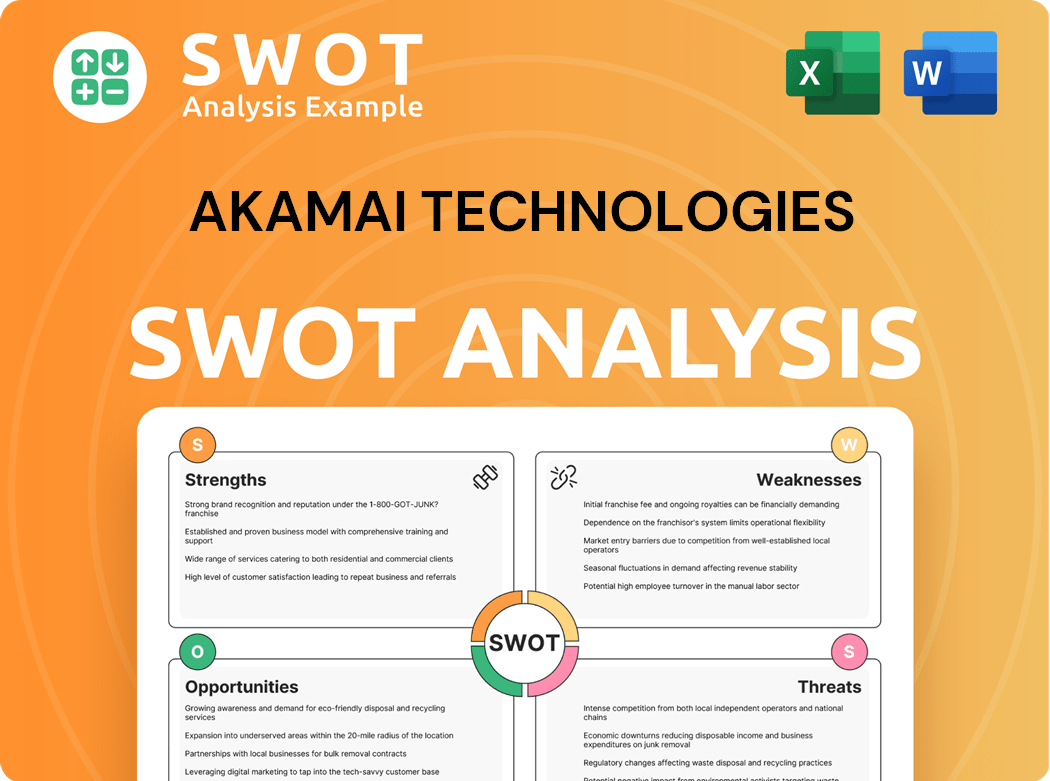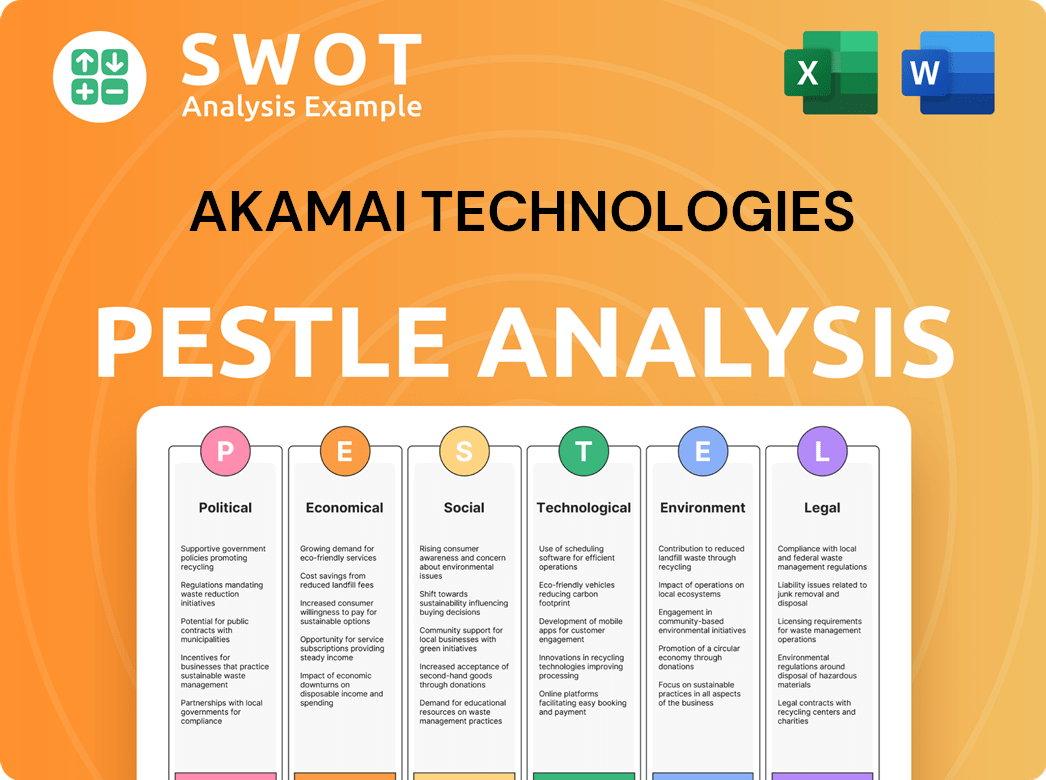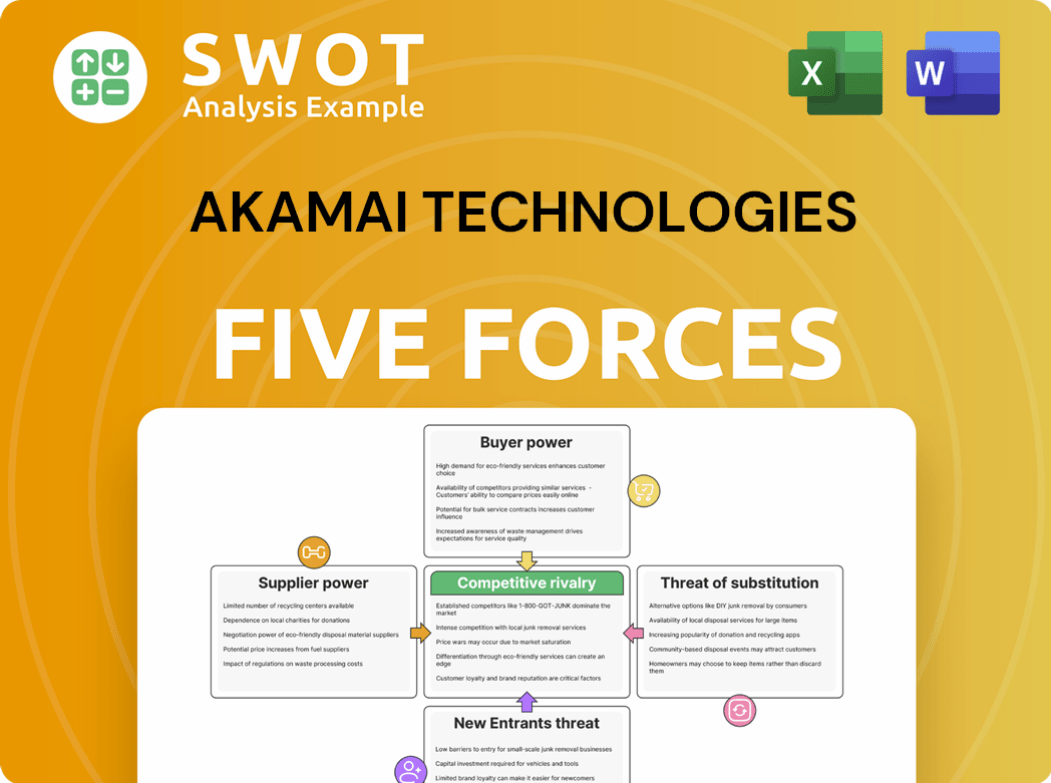Akamai Technologies Bundle
Can Akamai Technologies Maintain Its Edge in the Digital Frontier?
In a world demanding instant access and ironclad security, Akamai Technologies stands at the forefront of content delivery and cybersecurity. Founded to solve internet congestion, Akamai has evolved into a global leader, but the digital landscape is ever-shifting. Understanding the Akamai Technologies SWOT Analysis is crucial to understanding its position.

This exploration of Akamai's competitive landscape will dissect its market position and identify its key rivals, providing a comprehensive market analysis. We'll examine the Akamai competitors, its strategic advantages, and the prevailing CDN market trends shaping its future. Delving into Akamai's competitive advantages and how it stacks up against rivals like Cloudflare and Amazon CloudFront will reveal the company's ability to maintain its market share.
Where Does Akamai Technologies’ Stand in the Current Market?
Akamai Technologies holds a significant position in the content delivery network (CDN), cybersecurity, and cloud services markets. The company is consistently recognized as a leading provider in the CDN space. Its extensive global network of servers is a core component of its market presence, enabling it to deliver content efficiently across various geographies.
The company's primary product lines include its core content delivery services, a comprehensive suite of web and application security solutions, and its cloud computing offerings. Akamai serves a broad spectrum of customers, including large enterprises, government agencies, and small-to-medium businesses. They have a strong presence in industries that rely heavily on online presence and performance, such as media, gaming, software, and financial services.
Over time, Akamai has strategically shifted its positioning, moving beyond its foundational CDN services to become a more comprehensive edge platform provider, integrating security and cloud computing capabilities. This diversification reflects the company's adaptation to evolving market demands and the increasing convergence of these previously distinct areas. While Akamai maintains a strong foothold in established markets, it is also actively expanding its presence in emerging regions and focusing on growth areas like cloud computing.
Akamai is a leading provider in the CDN market, often cited among the top global players. The company's market share fluctuates, but it consistently maintains a significant presence. In 2024, Akamai's market share in the CDN space is estimated to be around 20-30%, depending on the specific service segment and geographic region.
Akamai's revenue is primarily derived from content delivery, web performance, and security solutions. In recent financial reports, the company has shown a strong revenue stream from its security solutions. Cloud computing services are also a growing segment, contributing a significant portion of the overall revenue. In 2024, security solutions accounted for approximately 50% of Akamai's revenue, with content delivery services contributing around 30%.
Akamai serves a diverse customer base, including large enterprises, media companies, and financial institutions. Key industries include media and entertainment, software, e-commerce, and financial services. The company's customer base includes many of the world's largest websites and online businesses. As of Q1 2024, Akamai reported serving over 200,000 customers globally.
Akamai has a global presence with a vast network of servers distributed across numerous countries. The company's network infrastructure is designed to deliver content and security services worldwide. Akamai's revenue distribution is well-diversified geographically, with significant contributions from North America, Europe, and the Asia-Pacific region. In 2024, North America accounted for approximately 50% of Akamai's revenue.
Akamai's competitive advantages include its extensive global network, comprehensive suite of services, and strong brand reputation. The company's strategy focuses on expanding its cloud computing and security offerings. Akamai is investing in edge computing to enhance its services. To learn more about Akamai's financial performance and growth strategy, you can read this article about Akamai Technologies.
- Extensive global network with over 400,000 servers in more than 130 countries.
- Focus on innovation and expansion into cloud computing and edge services.
- Strong partnerships and customer relationships across various industries.
- Strategic acquisitions to enhance its service offerings and market position.
Akamai Technologies SWOT Analysis
- Complete SWOT Breakdown
- Fully Customizable
- Editable in Excel & Word
- Professional Formatting
- Investor-Ready Format

Who Are the Main Competitors Challenging Akamai Technologies?
The competitive landscape for Akamai Technologies is intense, with a variety of rivals vying for market share in the Content Delivery Network (CDN), cybersecurity, and cloud services sectors. Understanding the key players and their strategies is crucial for assessing Akamai's position and future prospects. The market is dynamic, with constant innovation and shifts in technology, requiring continuous analysis to stay informed about the competitive environment.
Akamai faces competition from established CDN providers, large cloud service providers, and specialized cybersecurity firms. Each competitor brings its own strengths and weaknesses, influencing Akamai's market share and strategic decisions. The evolving needs of customers in the digital realm further shape the competitive dynamics, making it essential for Akamai to adapt and innovate to maintain its position.
The competitive environment requires a deep dive into Akamai's rivals, including their market strategies and technological advancements. This analysis helps to provide a clear understanding of the challenges and opportunities Akamai faces. For a comprehensive view, consider reading about the Marketing Strategy of Akamai Technologies.
In the CDN market, Akamai competes with companies like Cloudflare, Amazon CloudFront, and Fastly. These rivals offer similar services, including content delivery, security, and edge computing. Cloudflare is a key competitor, known for its wide range of services and competitive pricing. Amazon CloudFront benefits from integration within the AWS ecosystem.
Large cloud service providers such as AWS, Microsoft Azure, and Google Cloud also compete with Akamai. These companies offer CDN and security solutions as part of their broader cloud platforms. They leverage their extensive infrastructure and existing customer relationships to compete effectively. These providers often bundle services, creating a competitive advantage.
In the cybersecurity space, Akamai competes with various vendors providing web application firewalls (WAF), DDoS protection, and other security services. These competitors range from large cybersecurity firms to more specialized players. The cybersecurity market is highly fragmented, with many companies offering specialized solutions.
Emerging players and evolving technologies pose competitive challenges for Akamai. New entrants focusing on specific niches within edge computing or serverless architectures can disrupt the market. These companies often offer innovative solutions tailored to specific customer needs. The rise of edge computing is a significant trend.
Mergers and alliances within the industry reshape the competitive dynamics. Stronger combined entities compete more effectively with Akamai. The competitive landscape is dynamic, with companies constantly innovating and adjusting strategies. Market trends and customer needs are constantly evolving, requiring adaptation.
Akamai's competitive advantages include its extensive global network, robust security offerings, and long-standing customer relationships. However, competitors like Cloudflare and AWS are also expanding their networks and service offerings. Akamai must continue to innovate to maintain its position. These advantages are crucial in a competitive market.
Analyzing Akamai's competitive landscape reveals that the company operates in a complex and dynamic market. Key Akamai competitors include established CDN providers, large cloud service providers, and specialized cybersecurity firms. The market is constantly evolving, with new entrants and technological advancements reshaping the competitive dynamics. Akamai's ability to innovate and adapt to these changes will be critical for its future success. For instance, Cloudflare's revenue in 2024 was approximately $1.6 billion, highlighting the intense competition in the CDN market. Understanding these factors is crucial for assessing Akamai's market position and growth potential.
Akamai's competitive landscape is characterized by a diverse set of rivals across its key business segments.
- The CDN market includes competitors like Cloudflare, Amazon CloudFront, and Fastly.
- Large cloud providers such as AWS, Microsoft Azure, and Google Cloud also offer CDN and security solutions.
- In the cybersecurity space, Akamai competes with various vendors providing security services.
- Emerging players and technological advancements constantly reshape the competitive dynamics.
Akamai Technologies PESTLE Analysis
- Covers All 6 PESTLE Categories
- No Research Needed – Save Hours of Work
- Built by Experts, Trusted by Consultants
- Instant Download, Ready to Use
- 100% Editable, Fully Customizable

What Gives Akamai Technologies a Competitive Edge Over Its Rivals?
Analyzing the Akamai Technologies competitive landscape reveals several key advantages that position it strongly in the market. The company's success is built on a foundation of robust infrastructure, technological innovation, and strong customer relationships. Understanding these elements is crucial for any market analysis of Akamai's competitive advantages and its ability to maintain its leadership in the Content Delivery Network (CDN) space.
Akamai distinguishes itself through its extensive global network, proprietary technologies, and a deep understanding of its customers' needs. These factors contribute to its ability to provide superior performance and security solutions. Examining Akamai's strategic moves and how they contribute to its competitive edge is essential for investors and analysts alike.
Akamai's competitive advantages are further enhanced by its ability to adapt to evolving market demands, including the increasing importance of cybersecurity and cloud services. This adaptability, combined with its core strengths, allows Akamai to maintain a strong position against its CDN providers and other Akamai competitors.
Akamai operates one of the world's largest distributed computing platforms, comprising over 400,000 servers in more than 130 countries. This extensive network enables content to be delivered closer to end-users, reducing latency and improving performance. This global reach is a significant barrier to entry for new competitors and a key differentiator in the CDN market trends.
The company invests heavily in research and development, resulting in advanced technologies for content delivery, web performance optimization, and cybersecurity. Its proprietary algorithms and security solutions provide robust protection against cyber threats. Akamai's commitment to innovation is evident in its continuous development of new products and services.
Akamai has long-standing relationships with a diverse and large customer base, including major players in media, finance, and government. These relationships foster customer loyalty and provide valuable insights into industry-specific needs. The company’s reputation for reliability and performance is a significant asset.
Akamai offers a comprehensive suite of services, including content delivery, web performance, and security solutions. This integrated approach allows it to provide more complete solutions than many point-solution competitors. Akamai's ability to offer a wide range of services enhances its value proposition to customers.
Akamai's competitive advantages are supported by its financial performance and strategic initiatives. For example, in 2024, the company generated approximately $3.6 billion in revenue, demonstrating its strong market position. To learn more about the company's long-term strategic plan, you can explore the Growth Strategy of Akamai Technologies.
Akamai's strengths include its global network, technological expertise, and strong customer relationships. These factors contribute to its ability to deliver superior performance and security solutions. Understanding these strengths is crucial for evaluating Akamai's position in the market and its ability to compete with rivals like Cloudflare, Fastly, and Amazon CloudFront.
- Extensive Global Network: Over 400,000 servers globally.
- Technological Innovation: Continuous investment in R&D for advanced solutions.
- Customer Loyalty: Long-standing relationships with major clients.
- Integrated Solutions: Comprehensive suite of services for various needs.
Akamai Technologies Business Model Canvas
- Complete 9-Block Business Model Canvas
- Effortlessly Communicate Your Business Strategy
- Investor-Ready BMC Format
- 100% Editable and Customizable
- Clear and Structured Layout

What Industry Trends Are Reshaping Akamai Technologies’s Competitive Landscape?
The competitive landscape for Akamai Technologies is shaped by evolving industry trends, intense competition, and significant opportunities. The company's position is influenced by the increasing demand for faster, more reliable, and secure online experiences. Understanding the dynamics of the Akamai competitors and the broader CDN market trends is crucial for assessing its future prospects.
Akamai faces risks such as pricing pressure and competition from major cloud providers. However, opportunities in edge computing and cybersecurity offer growth potential. A thorough market analysis helps in understanding Akamai's strengths and weaknesses, and how it can capitalize on emerging opportunities in the digital landscape.
The primary trend is the escalating need for high-performance content delivery and robust cybersecurity solutions. The growth of streaming video, cloud-native applications, and the Internet of Things (IoT) fuels this demand. These factors collectively drive the CDN market trends, creating both challenges and opportunities for Akamai Technologies.
Intense competition from hyperscale cloud providers like AWS, Microsoft Azure, and Google Cloud poses a significant challenge. These providers offer integrated services and substantial resources. Continuous innovation in cybersecurity is also necessary to combat evolving threats. The company needs to continuously innovate to stay ahead.
Edge computing represents a substantial growth area for Akamai, with its extensive network well-positioned to support applications like IoT and 5G. The growing importance of cybersecurity provides significant opportunities as well. Expansion into new geographic markets further enhances growth potential, and the company’s integrated platform is a key differentiator.
The competitive landscape includes both established CDN providers and emerging players. Understanding the strengths and weaknesses of Akamai's main rivals is essential. The company's ability to innovate and effectively compete with large cloud providers will be critical for maintaining its market position. For example, a comparison between Akamai vs Cloudflare shows different approaches to the market.
Akamai's future success hinges on its ability to navigate these trends and challenges. The company must leverage its strengths in edge computing and cybersecurity while effectively competing with larger cloud providers. A deeper dive into the Akamai's competitive advantages and its financial performance is essential. For more details on Akamai's business model, you can read about the Revenue Streams & Business Model of Akamai Technologies.
Several factors influence Akamai's competitive position, including technological innovation, pricing strategies, and market expansion. Analyzing Akamai's growth strategy and its ability to adapt to evolving market demands is essential. The company's ability to maintain and enhance its infrastructure is also crucial.
- Edge Computing: Capitalizing on the growth of edge computing to support new applications.
- Cybersecurity: Leveraging its integrated platform to meet the increasing demand for robust security solutions.
- Market Expansion: Exploring new geographic markets and expanding its cloud computing services.
- Innovation: Investing in continuous innovation to stay ahead of competitors and evolving threats.
Akamai Technologies Porter's Five Forces Analysis
- Covers All 5 Competitive Forces in Detail
- Structured for Consultants, Students, and Founders
- 100% Editable in Microsoft Word & Excel
- Instant Digital Download – Use Immediately
- Compatible with Mac & PC – Fully Unlocked

Related Blogs
- What are Mission Vision & Core Values of Akamai Technologies Company?
- What is Growth Strategy and Future Prospects of Akamai Technologies Company?
- How Does Akamai Technologies Company Work?
- What is Sales and Marketing Strategy of Akamai Technologies Company?
- What is Brief History of Akamai Technologies Company?
- Who Owns Akamai Technologies Company?
- What is Customer Demographics and Target Market of Akamai Technologies Company?
Disclaimer
All information, articles, and product details provided on this website are for general informational and educational purposes only. We do not claim any ownership over, nor do we intend to infringe upon, any trademarks, copyrights, logos, brand names, or other intellectual property mentioned or depicted on this site. Such intellectual property remains the property of its respective owners, and any references here are made solely for identification or informational purposes, without implying any affiliation, endorsement, or partnership.
We make no representations or warranties, express or implied, regarding the accuracy, completeness, or suitability of any content or products presented. Nothing on this website should be construed as legal, tax, investment, financial, medical, or other professional advice. In addition, no part of this site—including articles or product references—constitutes a solicitation, recommendation, endorsement, advertisement, or offer to buy or sell any securities, franchises, or other financial instruments, particularly in jurisdictions where such activity would be unlawful.
All content is of a general nature and may not address the specific circumstances of any individual or entity. It is not a substitute for professional advice or services. Any actions you take based on the information provided here are strictly at your own risk. You accept full responsibility for any decisions or outcomes arising from your use of this website and agree to release us from any liability in connection with your use of, or reliance upon, the content or products found herein.